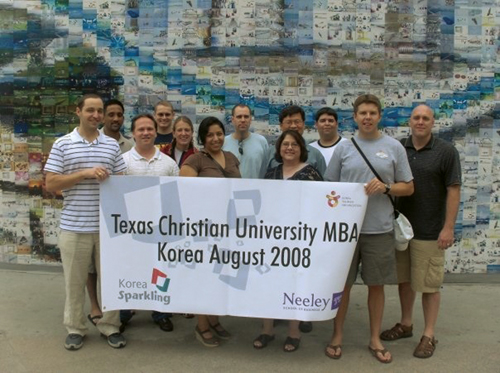Study Abroad | Business | Liberal Arts | Writing Center
| Science/Engineering | Briefs | Object Lesson

Seoul mates
Neeley signs student exchange agreement with
Korea University Business School.

By Rachel Stowe Master '91
The Neeley School of Business recently inked an agreement with Korea University Business School (KUBS) in Seoul to provide Neeley's first student exchange program in Asia. The program is open to all undergraduate business majors and is expected to begin fall 2009.
"One of the things that is very appealing about the Korea exchange program is that KUBS, at a number of levels, is very attractive," said Robert T. Rhodes, associate professor of professional practice and director of international programs. "First, it's accredited by the AACSB [Association to Advance Collegiate Schools of Business], which may be the most important designation that a school of business can have. No. 2, I think it's probably fair to refer to it as the No. 1 business school in Korea. And No. 3 - and maybe of greatest importance - is 55 percent of their classes are offered in English."
In addition, KUBS already has approximately 270 international students. "So you would anticipate that it would be a real welcoming environment for somebody who would be interested in going," he noted.
The program's application process will take into consideration a Neeley student's progress within his or her major and what KUBS courses are available to integrate into that degree plan. Students will likely take 12 to 15 hours and live on campus.
Neeley and KUBS are hoping for a "two-two exchange" to start. "That's kind of the model that we've used," Rhodes said, noting that Neeley exchange students pay tuition to TCU while attending KUBS and likewise KUBS students pay tuition to Korea University while they attend TCU. "So it's useful if we're both sending the same number of students in terms of balancing it all out."
The seeds for the program were planted by Neeley's Steve Lim, associate professor of accounting and an alumnus of Korea University. In December 2007, when he and Garry Bruton, management professor and president of the Asia Academy of Management, were on business in Korea, they visited with Korea University to discuss establishing a relationship with TCU. The talks evolved into the Korea/Japan trip that MBAs took in August - an eight-to-10-day study abroad that Neeley plans to offer again in August 2009 - as well as the more intense, semester-long undergraduate exchange relationship.
Neeley also has a formal student exchange program with a university in Dijon, France, and has its sights set on additional partner universities.
"I think it's really easy for an American to become isolated by the oceans that surround us. It really is difficult if you live in America to gain much perspective beyond one's own self-interest. I've often said that I didn't really come to understand my own country until I left it," Rhodes said. "By having that perspective, I think it makes you more open to critically asking questions about how our own systems operate."
In addition to student exchange, Neeley also offers study abroad programs with the same goal of giving students a global perspective - but in a shorter time frame. This academic year, Neeley's offerings include graduate-level trips to Chile, Italy, India, Guatemala, China, Germany and Korea/Japan. At the undergraduate level, Neeley Fellows travel to Chile and the Next Generation Leadership Program is going to London and Scotland. Two additional programs are open to all undergraduates: One will visit China and the other will spend three weeks in Europe.

Rules of attraction
Neeley signs student exchange agreement with
Korea University Business School.
By Kathryn Hopper
What makes a guy look good to women? Other women, it turns out.
Psychology assistant professor Sarah E. Hill found that women generally find men more desirable if they are with other women, compared to men with other men or men alone.
Her research, published in a journal for the Society for Personality and Social Psychology, examined the reactions of women who rated the attractiveness of 10 men in photos. One group of women rated photos picturing men with women, another group rated the same men in photos with other men and a third group judged the same 10 men pictured by themselves.
Hill says the results back up the theory of evolutionary psychology in mate selection.
"The things women find attractive - ambition, status and access to financial resources - are not something you can easily ascertain from appearances," she said. "Because it's more difficult to tell if he has those things based on looks, women will rely on his attractiveness to other women."
In contrast, men are swayed more by purely physical qualities, she said, such as "youth and symmetry" that are easily judged in photos.
When Hill did the same experiment on male subjects, she found men were more likely to find women pictured alone as the most attractive. She said those results also hearken back to our evolutionary roots when men competed for women to build their power base in the tribe.
"Men tend to be more aggressive, so if you go after another man's woman, that man could come after you and kill you," she said. "Plus, the woman might already be pregnant with his child."
Interestingly, she said men also viewed women pictured with other women as less attractive than the same women alone. She said it may be because men are more intimidated by a group of women and also because it presents too many choices.
"I think it's like the phenomenon of having hundreds of channels on television and not being able to find anything you want to watch," she said. "If you only have a few channels, you're more likely to think ‘Deal or No Deal' looks real good."

Comment about this story at tcumagazine@tcu.edu.
|



